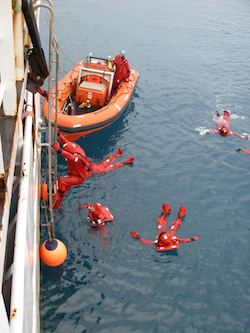I always assumed that falling into cold water was more dangerous because you can die from hypothermia. It turns out that it's even more dangerous than that. Falling into cold water can also trigger something called "cold shock response," which can cause you to drown in an instant.
Here's an example of how it works. On the official Coast Guard blog, Paul Newman, a USCG boating safety specialist, points to the case of a man who had taken a stand-up paddleboard (also called a SUP) onto Lake Tahoe. The man had brought a lifejacket with him, but instead of wearing it, he tied it the leash of the board (which should have been around his ankle). About 50 yards from shore, he fell off and drowned instantly.
Cold water makes time critical. Crew members take part in a survival suit drill on the NOAA ship Ka'imimoana. NOAA photoSo what happened? Newman points out he didn't hit his head. Most likely, he died from cold shock response. Ever jump into a cold shower and gasp? It's that same reflex, he says:
"The sudden fall into cold water made him gasp underwater. Aspirating water he began choking, probably panicked and, sinking into even colder deep water, made ineffective, frantic movements with his arms which had been momentarily stunned by the cold water. He wasn't wearing a lifejacket and he died without ever surfacing."
According to findings from the 2008 research project Cold Water Bootcamp, cold water kills quickly and it doesn't even have to be that cold (just under 70 degrees F). That day on Lake Tahoe, it was summer and the air temperature 75 degrees with surface water temperatures around 60 degrees.
If cold shock response doesn't kill you in the first minute, within 10 minutes your limbs start to become incapacitated, making it difficult or impossible for even strong swimmers to get back to a boat. In about an hour, hypothermia sets in. As Newman repeats a half a dozen times, "wearing a lifejacket buys you time."
Though Newman targets his advice at recreational boaters, the same logic works for commercial fishermen who find themselves in cold water. Commercial fisherman Lee d'Entremont credited having his survival suit on with saving his life and those of two other crewmen and an observer from Canada's Department of Fisheries and Oceans when the 64-foot Poseidon Princess sank off Nova Scotia last weekend.
They had about five minutes after waking up in the early morning to don their suits and put out a mayday call before the boat sank beneath them. The three crew members made it into a self-inflating life raft, while the observer, David Murphy, spent over an hour in the water. Nearby fishing boats responded to the distress call and pulled them out of the water. All four were wearing immersion suits and all four survived.
That's no coincidence, says d'Entremont. "All the gear was up to snuff, everything was working good and I can't say enough about the immersion suits.... For the one I had, it was the ultimate thing to have on in that situation. Saved my life, other than that I only had shorts on," he recalled to CBC News.
According to d'Entremont he was lucky: He lost his cell phone on the boat, but he had left his wallet at home. Preparedness, not luck, was the reason he and others survived that sinking. Check your safety equipment and make sure it's in good shape and that you can get your survival suit on quickly.







